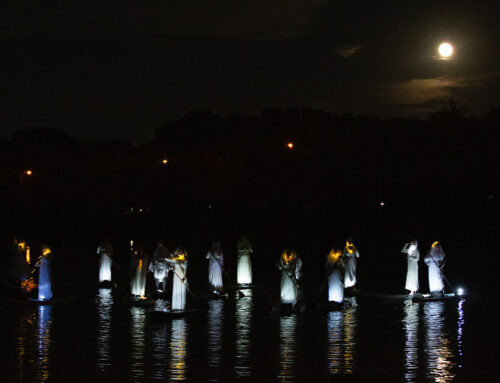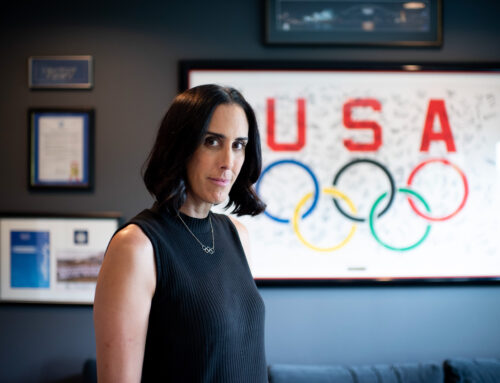Thanks to 24-hour news networks, images of the war in Iraq are indelibly stamped on our minds. Humvees careening across desert sand. Bombs exploding amid crowded marketplaces. Children lining the streets, hands outstretched for soldiers to fill them with candy. Women draped in burkas weeping for their dead. Families on airstrips clutching their just-returned relatives for dear life.
With more than three years of combat behind us, it has become easy enough for most of us to change the channel when these images flash across the screen. But for some in our neighborhood, it’s not that simple. They don’t associate Iraq with unnamed soldiers on television — for them, the war evokes faces of sons and daughters, husbands and wives.
Some of our neighbors are still fighting. Others have already returned. Still others are headed back after being called up a second, even third time.
“We’ve got to keep this in the front of people’s minds,” one mother pleads. “It’s there — it’s not going away yet.”
The next time someone mentions Iraq, we hope these faces come to mind.
Cpl. Michael Flowers, Marines
Age: 23
Expeditionary force
On the frontlines, the streets of Iraq, every day held a different assignment, and every day meant life or death. “You’re a boy, you’re just out of high school, and it’s man up — it’s just what you’ve got to do to live and get by. You have to grow up fast, and not just fast, but immediately. You’re thrown to the wolves.” This was where Michael Flowers found himself right after boot camp and training. The war had barely begun when the 2001 Woodrow graduate entered the U.S. Marine Corps. “I didn’t feel right watching people over there fighting,” he says. “I felt it was my obligation — somebody had to step up.” As a result, Flowers spent three Thanksgivings, three Christmases and three New Years away from his family. Though difficult, the experience strengthened him — “it made me able to handle any situation and get through it” — and also humbled him. Now that he’s home, Flowers finds he stops in the middle of something just to appreciate the moment. He can’t help it after what he’s seen. “The way the Iraqi people are living is pretty miserable. They’re living in fear for their lives every day, plus they’re living in poverty.” And the weight of it all still follows him — just a few weeks ago his battalion lost a couple of people. But Flowers doesn’t regret his decision. “I’m proud of what I did, and I would do it again in a heartbeat.”
Lt. Stephen Holly, Navy
Age: 28
Special operations forces
When they didn’t return, it was understood that their situations had grown too dangerous. “You hated to see it happen, but you can’t judge anyone when you yourself have not gone through what those guys are having to deal with,” says Navy SEAL Stephen Holly, talking about the Iraqi troops he helped train during his second deployment. (He spent a total of nine months in Iraq during 2004 and 2005.) His job — teaching the troops reconnaissance and intelligence capabilities — was hard work, especially considering that most of his trainees had been in the Iraqi army less than a year. But the toughest part for Holly was wondering which of them would return after delivering paychecks to their families back home — families whose lives were at risk because their husbands, fathers and sons had chosen to wear the Iraqi uniform. Holly’s own life was in danger “plenty of times,” but he brushes this fact aside to heap praise upon his Iraqi brothers in arms: “It was remarkable to see their dedication to trying to become a valid and competent military force for themselves and for their country.” Holly came home last September and resigned from active duty after his wife, Molly, gave birth to their son, Stephen Holly III, whom they call “Tripp.” A baby changes your priorities, Holly says, but his mind is never too far from those halfway across the world. “I think about it every day, but the tradeoff is I get to come home to my wife and my new son.”
2nd Lt. Dexter Allen, Army
Age: 35
Intelligence
When an insurgent plants a car bomb on the side of the road, everyone watches, but no one is willing to breathe a word about it. “People know who the insurgents are, but they’re afraid of reprisals. The insurgents will kill them, point blank. They won’t try to decipher who’s giving information; they’ll kill the whole family, and that includes children and babies.” This made Dexter Allen’s job as an intelligence gatherer tough — “one step forward and about four steps back,” as he describes it. He spent 18 months in Tikrit trying to find and capture enemies, his first overseas assignment in more than a decade. Allen entered the Army in ’88, served a four-year tour of duty, then became a reservist (and a schoolteacher) until being called to Iraq. When he returned home last November, Allen launched a home repair and remodeling business, but his civilian days screeched to a halt when another conscription arrived in the mail — even though his reserve status was up last November. But because of the Pentagon’s stop-loss policy, which extends enlistments in times of national emergency, Allen is headed to either Afghanistan or the United States-Mexico border. And he’s not feeling too good about it, especially if his orders lead him back to the Middle East. “I feel like we’re not doing all the necessary things to win this war,” Allen says. “It’s become a political war, just like Vietnam, and I don’t think we’re going to win in the long run.”
Because of Allen’s role in Army intelligence, he could not be photographed for this story.
Lance Cpl. Michael Florer, Marines
Age: 23
Ordinance specialist
The first time the gas alarm sounded, Michael Florer was working on a jet at the far end of the flight line. He sprinted 500 yards in the sweltering desert heat to get to his bunker, where he threw on his gas mask and gear and took cover. Florer had arrived at Kuwait’s Ahmed Al Jaber air base in February 2003. As soon as the war began the following month, “all hell broke loose,” Florer recalls. Fresh from Marine combat training, he found himself hustling to load explosives onto the jets, his 17-hour days interrupted every hour or two by gas alarms. Florer later learned that it was mostly U.S. missiles flying over the base that triggered the alarms. “But at the time, we thought it was all incoming.” He was in Kuwait only three months and never set foot in Iraq, but Florer knows the magnitude of his role. “On one hand, I was lucky because I didn’t have to look down the barrel of a rifle and shoot people, but unfortunately, we’re responsible for a lot more death and destruction than a bullet can cause. It’s a hard situation to grasp — to be so young, be 19 years old, and be killing people by the droves.” He tries to push thoughts like this out of his head, but it’s something he struggles with, something that gives his buddies nightmares. “I guess every generation has to pay the price at some point. Better me — somebody who volunteers — than somebody forced to do it. I knew what Marines do. I knew that when I signed my name on the dotted line.”





